Intro
Canker sores, also known as aphthous ulcers, are a common oral health issue that affects millions of people worldwide. Despite their prevalence, canker sores remain poorly understood, and many myths surround their causes, symptoms, and treatment. In this article, we will delve into the world of canker sores, exploring their definition, symptoms, causes, and treatment options. Whether you are a sufferer of canker sores or simply interested in learning more about this common oral health issue, this article aims to provide you with a comprehensive understanding of canker sores and how to manage them.
Canker sores can be a frustrating and painful experience, making everyday activities like eating, drinking, and talking a chore. They can appear at any time, without warning, and can be triggered by a variety of factors, including stress, hormonal changes, and certain foods. Despite their seemingly random appearance, canker sores are a legitimate health concern that requires attention and proper care. By understanding the facts about canker sores, you can take the first step towards managing your symptoms and preventing future outbreaks.
The importance of understanding canker sores cannot be overstated. Not only can they cause significant discomfort and pain, but they can also be a sign of an underlying health issue. Certain medical conditions, such as celiac disease, Crohn's disease, and ulcerative colitis, can increase the risk of developing canker sores. Additionally, canker sores can be a symptom of a nutritional deficiency, such as a lack of vitamin B12 or iron. By educating yourself about canker sores, you can take a proactive approach to your oral health and overall well-being.
What are Canker Sores?
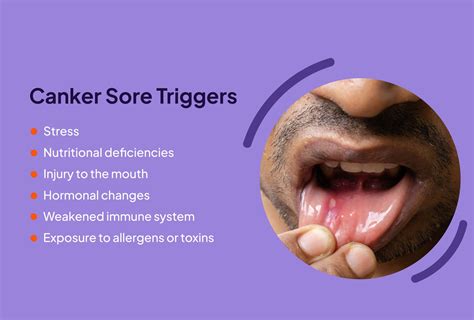
Types of Canker Sores
There are three main types of canker sores: minor, major, and herpetiform. Minor canker sores are the most common type and are usually small, round, and shallow. They can appear singly or in clusters and can heal on their own within a week or two. Major canker sores are larger and deeper than minor canker sores and can take longer to heal. Herpetiform canker sores are the least common type and are characterized by a cluster of small, shallow ulcers that can resemble a herpes outbreak.Canker Sore Causes and Risk Factors
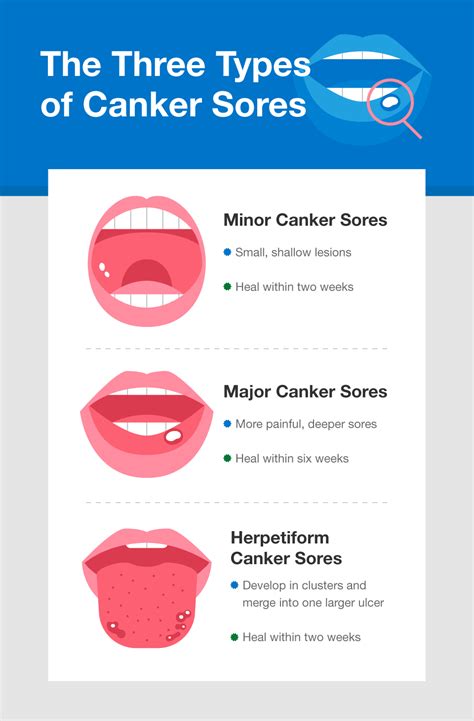
Prevention and Treatment
While canker sores cannot be completely prevented, there are several steps you can take to reduce your risk of developing them. These include: * Practicing good oral hygiene, such as brushing and flossing regularly * Avoiding trigger foods and drinks * Managing stress and anxiety through relaxation techniques, such as meditation or deep breathing * Getting regular check-ups with your dentist * Avoiding oral trauma, such as biting your tongue or the inside of your cheekCanker Sore Symptoms and Diagnosis
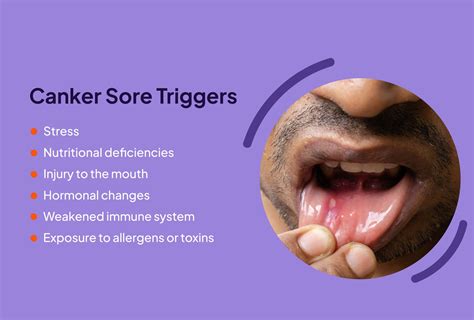
Diagnosis and Treatment Options
Canker sores are usually diagnosed based on a physical examination and medical history. Your dentist or healthcare provider may perform a visual examination of the affected area and ask questions about your symptoms and medical history. In some cases, a biopsy may be necessary to rule out other conditions, such as oral cancer.Treatment for canker sores usually involves a combination of self-care measures and topical treatments. Self-care measures include:
- Avoiding trigger foods and drinks
- Practicing good oral hygiene
- Using a soft-bristled toothbrush and gentle toothpaste
- Avoiding oral trauma
- Getting regular check-ups with your dentist
Topical treatments include:
- Over-the-counter pain relievers, such as ibuprofen or acetaminophen
- Topical anesthetics, such as lidocaine or benzocaine
- Antimicrobial mouthwashes, such as chlorhexidine
- Protective pastes or gels, such as Orabase or Orajel
Canker Sore Complications and Prevention
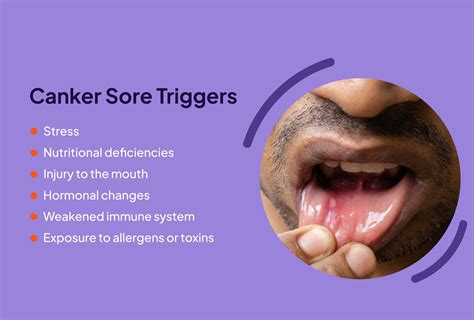
Prevention is key to managing canker sores. By practicing good oral hygiene, avoiding trigger foods and drinks, and managing stress and anxiety, you can reduce your risk of developing canker sores.
Home Remedies and Natural Treatments
In addition to self-care measures and topical treatments, there are several home remedies and natural treatments that can help soothe and heal canker sores. These include: * Aloe vera gel, which can help reduce pain and inflammation * Honey, which has antimicrobial properties and can help promote healing * Saltwater rinses, which can help reduce pain and inflammation * Baking soda, which can help neutralize acid and reduce pain * Tea tree oil, which has antimicrobial properties and can help promote healingCanker Sore FAQs
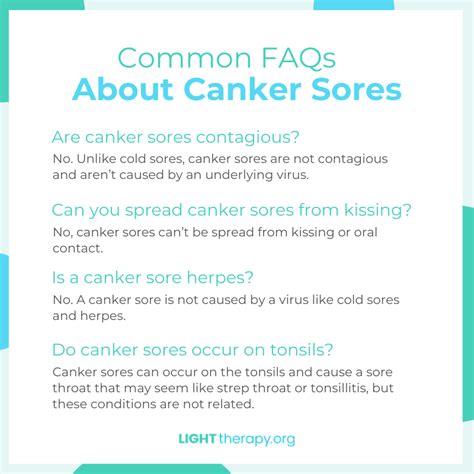
What causes canker sores?
+Canker sores are caused by a combination of factors, including stress, hormonal changes, certain foods, and nutritional deficiencies.
How can I prevent canker sores?
+You can prevent canker sores by practicing good oral hygiene, avoiding trigger foods and drinks, managing stress and anxiety, and getting regular check-ups with your dentist.
What are the symptoms of canker sores?
+The symptoms of canker sores include a small, shallow lesion on the tongue, lips, or gums, pain or discomfort when eating, drinking, or talking, and redness and swelling around the affected area.
In conclusion, canker sores are a common oral health issue that can be painful and frustrating. By understanding the causes, symptoms, and treatment options, you can take a proactive approach to managing your symptoms and preventing future outbreaks. Whether you are a sufferer of canker sores or simply interested in learning more about this common oral health issue, we hope this article has provided you with a comprehensive understanding of canker sores and how to manage them. We invite you to share your thoughts and experiences with canker sores in the comments below and to share this article with anyone who may be interested in learning more about this topic.
